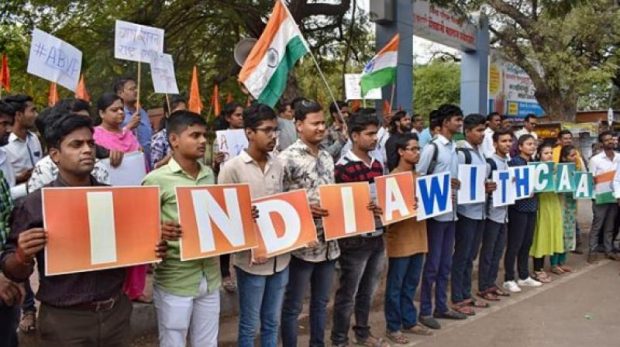
Over 1,000 academicians release statement in support of CAA
PTI, Dec 22, 2019, 11:40 AM IST

New Delhi: As many as 1,100 academicians and research scholars from various universities across India and abroad as well as prominent persons released a statement in support of the amended Citizenship Act on Saturday.
The signatories to the statement include Rajya Sabha member Swapan Dasgupta, Shishir Bajoria, Chairman, IIM Shillong, Sunaina Singh, Vice Chancellor, Nalanda University, JNU professor Ainul Hasan, Abhijit Iyer-Mitra, Senior Fellow, Institute of Peace and Conflict Studies and journalist Kanchan Gupta.
The statement comes in the midst of countrywide protests against the new citizenship law. Students from various universities have also joined the agitation.
In the statement, the signatories appealed to every section of the society “to exercise restraint and refuse to fall into the trap of propaganda, communalism and anarchism”.
“We also note with deep anguish that an atmosphere of fear and paranoia is being created in the country through deliberate obfuscation and fear-mongering, leading to violence in several parts of the country,” the statement said.
Two weeks ago, over 1,000 scientists and scholars had signed a petition demanding that the Citizenship Amendment Bill in its current form be withdrawn, with noted academician Pratap Bhanu Mehta saying the legislation will transform India into an “unconstitutional ethnocracy”. The petition had come after the Lok Sabha had passed the bill and before it was passed in the Rajya Sabha.
Later, 600 artistes, writers, academicians, former judges and former bureaucrats had urged the government to withdraw the Citizenship (Amendment) Bill, terming it as “discriminatory, divisive” and violative of the secular principles enshrined in the Constitution.
The signatories to the statement congratulated Parliament for “standing up for forgotten minorities”, “upholding the civilisational ethos of India” and “providing a haven for those fleeing religious persecution”.
The act fulfilled the long-standing demand of providing refuge to persecuted religious minorities from Pakistan, Bangladesh and Afghanistan, the statement said.
Ever since the failure of the Liaquat-Nehru Pact of 1950, various leaders and political parties such as the Congress, CPI(M) etc., cutting across the ideological spectrum, had demanded grant of citizenship to religious minorities from Pakistan and Bangladesh, who mostly belonged to the Dalit castes, it added.
“We also note with satisfaction that the concerns of the north-eastern states have been heard and are being addressed appropriately. We believe that CAA is in perfect sync with the secular Constitution of India as it does not prevent any person of any religion from any country seeking Indian citizenship,” the statement said.
Nor did it change the criteria of citizenship in any way; merely providing a special expedited redress, under special circumstances, for minorities fleeing religious persecution from three specific countries i.e Pakistan, Bangladesh and Afghanistan, it added.
“It does not in any way prevent Ahmadis, Hazaras, Baloch or any other denominations and ethnicities, from these same three countries, seeking citizenship through regular processes,” the statement said.
Udayavani is now on Telegram. Click here to join our channel and stay updated with the latest news.
Top News

Related Articles More

‘Condition critical’, say doctors as farmer leader Dallewal’s fast enters 27th day

ISRO to study how crops grow in space on PSLV-C60 mission

Vandalism at Allu Arjun’s residence in Hyderabad

PM Modi to attend Christmas celebrations hosted by Catholic Bishops’ Conference of India

UP: Ancient stepwell unearthed in Sambhal district’s Chandausi
MUST WATCH
Latest Additions

Mandhana, Renuka blow away West Indies in first ODI

‘Condition critical’, say doctors as farmer leader Dallewal’s fast enters 27th day

ISRO to study how crops grow in space on PSLV-C60 mission

Vandalism at Allu Arjun’s residence in Hyderabad

PM Modi to attend Christmas celebrations hosted by Catholic Bishops’ Conference of India
Thanks for visiting Udayavani
You seem to have an Ad Blocker on.
To continue reading, please turn it off or whitelist Udayavani.


















